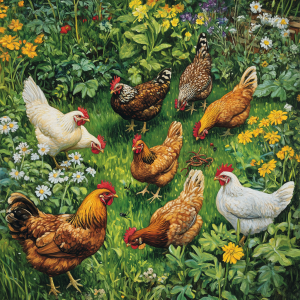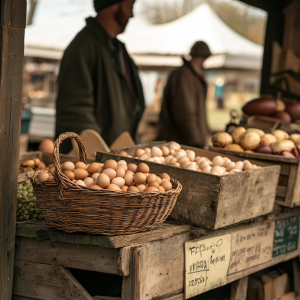
Raising chickens can be so rewarding and cost effective too.
Once upon a time, raising chickens meant tossing a handful of feed and collecting eggs. Simple, right? Well, times have changed, and so have the methods for keeping those feathery friends happy and healthy. For the modern self-reliant enthusiast, raising chickens without relying on store-bought feed isn’t just possible—it’s downright empowering. With a bit of ingenuity and a dash of old-fashioned resourcefulness, you can keep your flock thriving while cutting down on costs and dependency.
Store-bought feed is convenient, sure, but it comes with drawbacks: rising prices, questionable ingredients, and a dependency on external supply chains. By finding alternative ways to nourish your flock, you can save money, ensure a healthier, more natural diet for your chickens, and reduce waste and environmental impact. This method also ensures that if there were a significant crisis, one could still raise their chickens without relying on disrupted supply chains. And let’s not overlook one of the greatest assets of chicken raising in a self-sufficient lifestyle: eggs. In a society-down scenario, eggs become more than breakfast—they’re a currency. You can trade fresh eggs for just about anything you need, from produce to firewood, making your flock an invaluable resource.
Chickens are natural foragers, and letting them roam is one of the easiest ways to keep them well-fed. A free-range chicken will happily munch on insects, worms, seeds, and greens. Rotating pastures can prevent overgrazing and give plants time to regrow, while encouraging wild plants like dandelions, clover, and chickweed provides a nutrient-packed diet your chickens will love.
Setting up a chicken-friendly garden is another fantastic way to provide a steady supply of greens, seeds, and even protein. Sunflowers are great for seeds, offering a high-protein treat, while alfalfa provides a nutrient-rich green that can be cut and fed fresh. Squash and pumpkins are also chicken favorites, with both the flesh and seeds offering valuable nutrition. Fodder systems, which involve sprouting grains like barley or wheat, can create a lush, nutritious feed for your flock.

During the Great Depression, eggs were invaluable
A well-maintained compost pile can double as a buffet for your birds. As food scraps break down, they attract bugs and worms, which provide a protein-packed snack. Vegetable peels, stale bread, and garden trimmings are perfect additions, but it’s important to avoid anything toxic like avocado skins or raw potatoes.
Protein is a critical component of a chicken’s diet, especially during egg-laying season. Raising mealworms or black soldier fly larvae can provide a reliable and high-protein food source. Setting up a worm bin for earthworms ensures a steady supply of protein year-round, while keeping your chickens entertained as they scratch and peck for their treats.
Your kitchen holds a treasure trove of chicken snacks. Vegetable scraps, leftover rice, and even fruit can supplement their diet. Just be cautious to avoid feeding them anything salty, sugary, or moldy. With careful planning, your kitchen waste can become a valuable resource for your flock.
While alternative feeds are fantastic, it’s essential to ensure your chickens get all the nutrients they need. A balanced diet includes protein for egg production and overall health, calcium for strong eggshells (crushed oyster shells or ground-up eggshells work well), carbohydrates for energy (grains like oats and corn), and vitamins and minerals from greens and veggies. Healthy, active chickens are a good sign that you’re on the right track, so keep an eye on your flock and adjust their diet as needed.
Raising chickens without store-bought feed isn’t just a nod to old-fashioned farming—it’s a modern, sustainable practice that puts you in control. By embracing foraging, growing your own feed, and using kitchen scraps wisely, you’ll keep your chickens healthy while embracing a more self-reliant lifestyle. And when the going gets tough, your flock will do more than sustain you—it’ll give you the power to barter, trade, and thrive. Plus, there’s nothing quite like the pride of cracking open an egg and knowing you’ve provided for your flock every step of the way.


